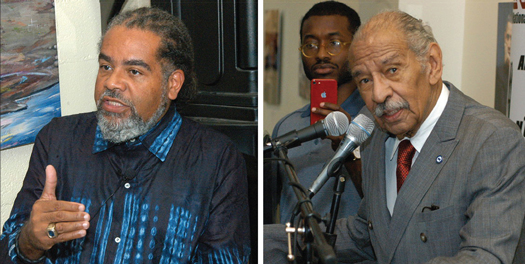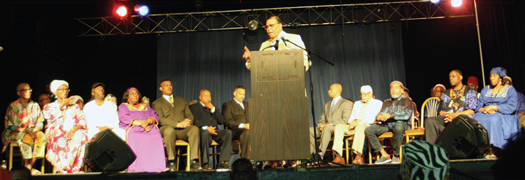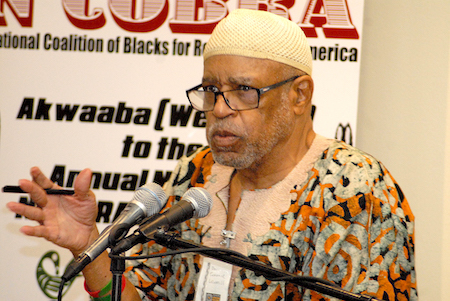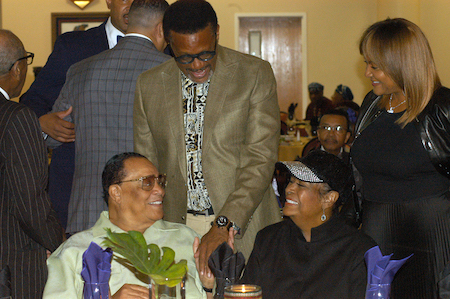MORE THAN JUST A CHECK for full repair of the Black community
By Starla Muhammad, managing editor | Last updated: Jun 27, 2019 - 9:32:02 AMWhat's your opinion on this article?

(l) Radio show host and activist Mark Thompson (r) Former Congressman John Conyers
|

The Honorable Minister Louis Farrakhan delivers keynote address at Bert’s Marketplace on June 22.
|
DETROIT—The National Coalition of Blacks for Reparations in America (N’COBRA) recently held its 30th annual convention. While a great deal of attention and focus of the weekend gathering dealt with the ongoing push to pass Congressional bills HR40 and S1083—The Commission to Study and Develop Reparations Proposals for African Americas Act to committee—organizers made it clear that was not the only goal of the gathering.
This year’s convention convened on the heels of a Congressional Hearing on Reparations in Washington, D.C., Juneteenth—commemorating when news of the abolition of slavery reached Texas in 1865, the marking of 400 years that many historians say the first enslaved Black Africans were brought to the shores of America and nearly halfway through the International Decade for People of African Descent from 2015-2024 proclaimed by the UN General Assembly.
“There’s major national attention on the issue of reparations especially on the governmental level and at the executive level, those candidates who are running for president. We’ve always had this conversation but not at this particular level, with this intensity as it is right now,” said Kamm Howard, national male co-chair of N’COBRA. This year’s conference theme was: “400 Years of Terror: A Debt Still Owed.”
“It’s extremely important that we begin to get the message out clearly what actually reparations are, what they’re designed to do and how they are to be distributed; what forms and shape they should be distributed. There’s a lot of misperception, a lot of incorrect notions around reparations so at this particular conference we really want to hammer home that there are international norms around reparations. When N’COBRA is fighting for reparations, that’s what we’re looking at—the full repair of our people” explained Mr. Howard.
He said the major misconception is that reparations mean fighting “for a check.” “Compensation is necessary but it’s not the only thing that the struggle is for. There are five components to full reparations.” According to Mr. Howard two of those components include:
Sessions and guarantees of non-repetition: How to stop bad acts that are continuing to occur like state sanctioned police violence, local and state and national laws that disproportionately effect Black people.
Restitution: How to return a people back to where they would have been had they not been injured in the first place? This addresses the structural components of education, economics, health disparities and other areas.
Reparations means full repair, not a band-aid approach to address the unfairness, injustice and historical ills Blacks have experienced and that future generations of Blacks will continue to face if it is not addressed, explained Mr. Howard.
“We’ve (N’COBRA) been doing this work for over 30 years and this new momentum, we’d like to take advantage of that because for some of our people they have to hear it on TV before they think it’s real and so now it’s a national conversation and we’re very glad about that,” said Mashariki Jywanza, female national co-chair of N’COBRA.
“We also have to look at our healing and help our people understand the work of reparations is work we have to do. We have to heal our communities. When we get our reparations that will help us. If they never do what they’re supposed to do, we still have to heal our community,” said Ms. Jywanza.
Educating the Black American public on full reparations or full repair and what that means economically, spiritually, mentally and educationally is critical, organizers and presenters pointed out during several sessions of the June 20-23 conference held in Detroit.
Conference events were held at various Black institutions in the city including: the Charles H. Wright Museum of African American History, Hotel St. Regis, Fellowship Chapel Conference Center, Timbuktu Academy of Science and Technology, Bert’s Marketplace and West Side Unity Church.

Longtime reparations advocates and educators attended including: Dr. Conrad Worrill, former chairman of National Black United Fund; Rev. JoAnn Watson, activist and former Detroit city councilperson; Attorney Adjoa Aiyetoro, Dr. Raymond Winbush, research professor and director of the Institute for Urban Research at Morgan State University; Attorney Nkechi Taifa; Mark Thompson, radio personality and activist; Dr. Greg Carr, chair of the African American Studies Department at Howard University, Attorney Faya Rose and many more. The gathering also paid homage to many Black nationalist and Pan African pioneers in the liberation struggle.
HR40 was introduced 30 years ago in 1989 by former Congressman John Conyers (D-Mich.). He introduced it every year until he left Congress in 2017. Rep. Sheila Jackson-Lee (D-Texas) picked up the mantle and vows to continue reintroducing the proposed legislation. The work and tenacity of Mr. Conyers was celebrated during the weekend and attendees stood and applauded as the 90-year-old elder stopped by on the third day of the conference and shared a few words. He was also presented with the Callie House and Reparations Ray Jenkins Trailblazer Award.
“This is a great afternoon. It’s important for a number of reasons but the main reason is that the struggle for justice goes on. It’s not over with yet and so here at this convention we’re here to make sure that it doesn’t fade away or some of our youngsters forget it. Some of our elders say, ‘we did our part, we don’t have to do much more,’ but the struggle for justice never ends,” said Mr. Conyers.
Each day of the conference began with ceremonial expressions rooted in African cultural traditions including drum calls and libations honoring ancestors who passed away. Many participants wore African-inspired clothing and vendors were on hand with dozens of books on African and Black history, jewelry, clothing, historical DVD presentations and much more.
During a special banquet held June 22 at Fellowship Chapel Conference Center, Judge Greg Mathis delivered remarks and shared how Black nationalist and Pan African ideology helped shape him as a young man and into adulthood.
Judge Mathis spoke on the importance of being free as a Black person in speaking and showing love for your people and the importance of reparations. “There is no statute of limitations for rape and murder. We deserve a serious hearing to talk about this issue,” said the popular judge who has been on the front lines working and advocating for solutions in the Flint water crisis still affecting residents.

Another highlight of the banquet was the Honorable Minister Louis Farrakhan being presented with the President Dr. Imari Obadele and Queen Mother Audley Moore Reparations Lifetime Achievement Award as recognition for his tireless work in the resurrection and service of Black people. Min. Farrakhan said he was honored to accept an award named after two people he had the pleasure of knowing.
“I will take this great, great honor with deep, deep humility knowing that the job is not done. But this I take as encouragement to keep on moving. I don’t have any plans to retire though I am squeezing 90,” the Minister said with a beaming smile as the audience applauded and shouted.
“The way my teacher taught me, we never quit our post until we’re properly relieved and I don’t care what time it is, death is the only thing that will cause us to be quiet, sit still. We do this work until death overtakes us because even though we’re not as young as we used to be, we’re much wiser than we once were,” the Minister continued. Min. Farrakhan also delivered the Keynote message to convention attendees and guests June 22.
Rev. Watson was mentored by “Reparations” Ray Jenkins, a longtime advocate for reparations from Detroit, and is excited about the momentum of the reparations movement. “It gives me chills. I witnessed that (Congressional) testimony and the panel of outstanding Africans who were unafraid to speak truth to power who are joining the movement and all of their oratory with facts, data and statistics about how much this country owes us,” said Rev. Watson.
She was particularly proud of the unity she observed on display at the conference. “Every key element in organizing in the Black community is here as we should be in unity. I’m so proud and honored. I’m just happy to be alive and to be able to bear witness and to see this transformation of reparations from marginal to in the middle of the storm for our people. It’s about time we had a wake-up call and put our arms around it.”
But organizers and attendees understand the momentum of the movement must extend beyond the conference.
“The action that we want to take out of this convention is that we’re focused on moving the two commission bill legislations out of lower committee into the full floors of the Senate and the House for a debate,” said Mr. Howard. Conference participants will be contacting 535 members of U.S. Congress (100 Senators, 435 Representatives), state legislators and local politicians to push them toward supporting the federal bills. Whether people are for or against reparations for Black people or are Liberal or Conservative, they should at least be for the debate, argues Mr. Howard. It took 15 years to pass the bill to make Martin Luther King Jr. Day a federal holiday and it has been twice that long that HR40 has been introduced so organizers understand the fight is not an easy one, but they are prepared to continue the push.
“We want to have this debate on the House and Senate floors and we’re leaving Detroit with a national action that we’re going to take across the country that makes sure that this legislation is moved to the House floor and to the Senate floor for America to hear the full debate around what has took place in this country against African people since 1619 and is currently taking place today,” said Mr. Howard.
Katrina Muhammad contributed to this report. For more information on N’COBRA, HR40 and S1083 and the campaign for reparations, visit ncobraonline.org. To view sessions from the convention, visit ncobraonline.org or noi.org. Stay turned for additional coverage from N’COBRA’s 30th Annual Convention in an upcoming issue of The Final Call.
—Starla Muhammad, managing editor
INSIDE STORIES AND REVIEWS
-
-
About Harriett ... and the Negro Hollywood Road Show
By Rabiah Muhammad, Guest Columnist » Full Story -
Skepticism greets Jay-Z, NFL talk of inspiring change
By Bryan 18X Crawford and Richard B. Muhammad The Final Call Newspaper @TheFinalCall » Full Story -
The painful problem of Black girls and suicide
By Charlene Muhammad -National Correspondent- » Full Story -
Exploitation of Innocence - Report: Perceptions, policies hurting Black girls
By Charlene Muhammad -National Correspondent- » Full Story -
Big Ballin: Big ideas fuel a father’s Big Baller Brand and brash business sense
By Bryan Crawford -Contributing Writer- » Full Story






 Click Here Stay Connected!
Click Here Stay Connected!








